Israel in the Eurovision Song Contest
Israel has participated in the Eurovision Song Contest 42 times since making its debut in 1973. Israel was able to enter the contest as the Israel Broadcasting Authority (IBA) was an active member of the European Broadcasting Union (EBU), which is responsible for the event. Israel has won the contest four times, and has hosted the contest in Jerusalem twice in 1979 and 1999. Israel hosted the contest for the third time in Tel Aviv in 2019.
| Israel | |
|---|---|
 | |
| Member station | Kan
Former members
|
| National selection events | Internal selection
National final
|
| Participation summary | |
| Appearances | 42 (36 finals) |
| First appearance | 1973 |
| Best result | 1st: 1978, 1979, 1998, 2018 |
| External links | |
| Kan page | |
| Israel's page at Eurovision.tv | |
Israel in the Eurovision Song Contest 2020 | |
Israel's first appearance at the contest in 1973 was successful, with Ilanit finishing fourth. Israel then achieved victories in 1978 and 1979, with wins for Izhar Cohen and the Alphabeta, with the song "A-Ba-Ni-Bi", and Milk and Honey, with "Hallelujah". In 1980, the IBA declined to host the contest[1] for the second successive year for financial reasons, and as the date for the contest in The Hague conflicted with Yom Hazikaron – Israeli Memorial Day – Israel did not participate. This is the only time that the winning country did not compete the following year. The country's best results in the 1980s were the second-place finishes for Avi Toledano in 1982 and Ofra Haza in 1983. Former winner Izhar Cohen returned to place fifth in 1985, before Duo Datz finished third in 1991. Israel achieved its third victory in 1998, with Dana International and "Diva". Eden then finished fifth in 1999. As of 2019, Israel has the record for most participations and most wins in the contest without ever coming last, but it has placed second to last in the final three times, in 1986, 1993 and 2006.
Since the introduction of the semi-finals in 2004, Israel has failed to reach the final six times. In 2005, Shiri Maimon gave the country its tenth top five result, finishing fourth. Having failed to qualify for the final for four consecutive years (2011–14), Israel reached the final for the first time in five years, with Nadav Guedj finishing ninth in 2015, and the country has participated in the final every year since. Israel's fourth victory came when Netta won the 2018 contest in Lisbon, with the song "Toy".
History
Victories
To date there have been four Israeli victories in the contest. Izhar Cohen and Alphabeta won in Paris in 1978 with the uptempo A-Ba-Ni-Bi. On home ground in Jerusalem the following year, Israel won again, this time with the anthemic Hallelujah performed by Milk and Honey. Unusually, Israel did not defend the title in 1980[1] (see below). The third victory came almost 20 years later in Birmingham in 1998. Singer Dana International took top honours with the song Diva, setting off widespread celebrations in Israel. Twenty years later, Israel earned their fourth victory at the 2018 contest in Lisbon, Portugal. The song was "Toy" by Netta Barzilai, which earned Israel their highest-ever score of 529 points.
Other performances
Israel's earliest selections were picked by the Israel Broadcasting Authority. The first singer to represent the country in 1973 was Ilanit, who finished 4th. Criticism increased after she was sent again four years later, leading to a rule that the winner of the already established Hebrew Song and Chorus Festival would also represent Israel at the contest. The Eurovision Song Contest winners of 1978 and 1979 were selected by this method. From 1981 the selection process was handled by the Kdam Eurovision with the exceptions of 1990, 1998, 1999, 2000, 2002–2004, 2006–2007 and 2010 where the selections were again picked by the IBA.
After winning the contest in 1978 and 1979, the IBA was financially and logistically unable to organise the event for the second consecutive year. The organization of the festival was subsequently handed over to the Netherlands who finally agreed to stage it. Because much time had already passed, it was difficult to find a suitable date for the Song Contest. The date chosen coincided with a memorial day in Israel, and the country was forced to withdraw. This made Israel the only country to date unable to defend its title. The 1980 Hebrew Song and Chorus Festival therefore did not double as a national final that year unlike the last two years, and the winning song "Pizmon Chozer" by the band The Brothers & the Sisters was never given the chance to participate in the Eurovision Song Contest. In 1984 Israel once again refrained from participating due to the same date conflict.
Apart from its victories, Israel's entries have had a mixed reception at the contest. Avi Toledano (1982) and Ofra Haza (1983) scored well with big revivalist numbers, but the all-singing, all-dancing style became less popular later in the decade and Israel's 1986 entry, Yavo Yom by Moti Giladi & Sarai Tzuriel, came in 19th, the country's worst showing yet.
In 1987 Israel finished 8th with Shir Habatlanim by the satiric duo Lazy Bums. Due to its satiric nature, it prompted then Israeli Minister of Culture, Yitzhak Navon, to threaten to resign, if the song went on to represent Israel on the night of the contest. However, he didn't.
In 1990 Rita's sensuous ballad was not well received, but in 1991, Orna and Moshe Datz finished third, Israel's best result since 1983. Israel's third victory occurred in 1998, when Dana International won the crown with her song "Diva." Israel also had a 5th-place finish by Eden when it hosted the 1999 contest. However, Ping-Pong's disco effort in 2000 failed badly, though the group was noted for their largely optimistic lyrics and message of reconciliation and peace in Western Asia. They went as far as waving Syrian flags at the end of their performance, angering some Israelis.
In 2004 David D'Or came in 11th in the semifinal with the song "Leha'amin" (להאמין), leaving Israel out of the finals for the first time since 1997. Shiri Maymon's performance in Kiev in 2005 brought Israel back to the top five, and ensured a place in the Athens 2006 final. In 2006, Israel was represented by singer Eddie Butler, who had finished 5th as part of Eden in 1999; however, his performance of the song "Together We Are One" finished 23rd, with just four points.
IBA's Eurovision committee chose the band Teapacks to represent Israel in the 2007 Eurovision Song Contest Semi-Final in Helsinki. Their humorous entry "Push the Button" did not fare well, finishing in 24th place out of a semifinal field of 28 and failing to reach the final. Israel had to compete in the semi-final in Belgrade 2008, from which it passed on to the final; Boaz finished ninth. At the Eurovision Song Contest 2009, an Arab citizen of Israel represented the country for the first time, as Mira Awad performed along with Jewish-Israeli singer Noa in Moscow. Israel was represented in 2010 by Harel Skaat, who came in 14th in the final.
Israel's participations from 2011 to 2014 were less successful, as former Eurovision winner Dana International in Düsseldorf, the band Izabo in Baku, Moran Mazor in Malmö and Mei Finegold in Copenhagen, all failed to qualify for the final. However, 16-year-old Nadav Guedj qualified with Golden Boy in 2015, the first Israeli song without a Hebrew lyric. Prior to their fourth win, they also managed to qualify in 2016 with Hovi Star and "Made of Stars" (which finished 14th) and in 2017 with Imri Ziv and "I Feel Alive" (which finished 23rd, Israel's lowest score in a Eurovision final since 2006). In 2019 as host country Israel was pre-qualified for the final, however, they eventually finished 23rd, Israel's lowest score in a Eurovision final since 2017), making it the fourth time since 2015 that the host country ranked in the bottom five.
In early 2020, it was confirmed that the 2020 season of HaKokhav HaBa would be the last time it would be used to select the Israeli entrant, with a separate national final to select the winning artist's Eurovision entry. Beginning in 2021, a new national final hosted by Lucy Ayoub is planned to select the Israeli entry.
Contestants
1 |
Winner |
2 |
Second place |
3 |
Third place |
X |
Entry selected but did not compete |
| Year | Artist | Language | Title | Final | Points | Semi | Points |
|---|---|---|---|---|---|---|---|
| Ilanit | Hebrew | "Ey Sham" (אי שם) | 4 | 97 | No semi-finals | ||
| Kaveret | Hebrew | "Natati La Khayay" (נתתי לה חיי) | 7 | 11 | |||
| Shlomo Artzi | Hebrew | "At Va'Ani" (את ואני) | 11 | 40 | |||
| Chocolate, Menta, Mastik | Hebrew | "Emor Shalom" (אמור שלום) | 6 | 77 | |||
| Ilanit | Hebrew | "Ahava Hi Shir Lishnayim" (אהבה היא שיר לשניים) | 11 | 49 | |||
| Izhar Cohen and the Alphabeta | Hebrew | "A-Ba-Ni-Bi" (א-ב-ני-בי) | 1 | 157 | |||
| Milk and Honey | Hebrew | "Hallelujah" (הללויה) | 1 | 125 | |||
| Hakol Over Habibi | Hebrew | "Halayla" (הלילה) | 7 | 56 | |||
| Avi Toledano | Hebrew | "Hora" (הורה) | 2 | 100 | |||
| Ofra Haza | Hebrew | "Hi" (חי) | 2 | 136 | |||
| Izhar Cohen | Hebrew | "Olé, Olé" (עולה, עולה) | 5 | 93 | |||
| Moti Giladi & Sarai Tzuriel | Hebrew | "Yavo Yom" (יבוא יום) | 19 | 7 | |||
| Lazy Bums | Hebrew | "Shir Habatlanim" (שיר הבטלנים) | 8 | 73 | |||
| Yardena Arazi | Hebrew | "Ben Adam" (בן אדם) | 7 | 85 | |||
| Gili & Galit | Hebrew | "Derekh Hamelekh" (דרך המלך) | 12 | 50 | |||
| Rita | Hebrew | "Shara Barkhovot" (שרה ברחובות) | 18 | 16 | |||
| Duo Datz | Hebrew | "Kan" (כאן) | 3 | 139 | |||
| Dafna Dekel | Hebrew | "Ze Rak Sport" (זה רק ספורט) | 6 | 85 | |||
| Sarah'le Sharon & The Shiru Group | Hebrew, English | "Shiru" (שירו) | 24 | 4 | Kvalifikacija za Millstreet | ||
| Liora | Hebrew | "Amen" (אמן) | 8 | 81 | No semi-finals | ||
| Galit Bell | Hebrew | "Shalom Olam" (שלום עולם) | Failed to qualify[lower-alpha 1] | 28 | 12 | ||
| Dana International | Hebrew | "Diva" (דיווה) | 1 | 172[lower-alpha 2] | No semi-finals | ||
| Eden | Hebrew, English | "Yom Huledet (Happy Birthday)" (יום הולדת) | 5 | 93 | |||
| PingPong | Hebrew, English | "Sameach" (שמח) | 22 | 7 | |||
| Tal Sondak | Hebrew | "En Davar" (אין דבר) | 16 | 25 | |||
| Sarit Hadad | Hebrew, English | "Light a Candle" | 12 | 37 | |||
| Lior Narkis | Hebrew, English | "Words for Love" | 19 | 17 | |||
| David D'Or | Hebrew, English | "Leha'amin" (להאמין) | Failed to qualify | 11 | 57 | ||
| Shiri Maimon | English, Hebrew | "HaSheket SheNish'ar" (השקט שנשאר) | 4 | 154 | 7 | 158 | |
| Eddie Butler | English, Hebrew | "Together We Are One" | 23 | 4 | Top 11 previous year[lower-alpha 3] | ||
| Teapacks | English, French, Hebrew | "Push the Button" | Failed to qualify | 24 | 17 | ||
| Bo'az Ma'uda | Hebrew, English | "The Fire In Your Eyes" | 9 | 124 | 5 | 104 | |
| Noa & Mira Awad | English, Hebrew, Arabic | "There Must Be Another Way" | 16 | 53 | 7 | 75 | |
| Harel Skaat | Hebrew | "Milim" (מילים) | 14 | 71 | 8 | 71 | |
| Dana International | Hebrew, English | "Ding Dong" (דינג דונג) | Failed to qualify | 15 | 38 | ||
| Izabo | English, Hebrew | "Time" | 13 | 33 | |||
| Moran Mazor | Hebrew | "Rak Bishvilo" (רק בשבילו) | 14 | 40 | |||
| Mei Finegold | English, Hebrew | "Same Heart" | 14 | 19 | |||
| Nadav Guedj | English | "Golden Boy" | 9 | 97 | 3 | 151 | |
| Hovi Star | English | "Made of Stars" | 14 | 135 | 7 | 147 | |
| IMRI | English | "I Feel Alive" | 23 | 39 | 3 | 207 | |
| Netta | English[lower-alpha 4] | "Toy" | 1 | 529 | 1 | 283 | |
| Kobi Marimi | English | "Home" | 23 | 35 | Host country[lower-alpha 5] | ||
| Eden Alene | English, Amharic[lower-alpha 6] | "Feker Libi" (ፍቅር ልቤ) | Contest cancelled[lower-alpha 7] X | ||||
| Eden Alene[2] | |||||||
Congratulations: 50 Years of the Eurovision Song Contest
| Artist | Language | Title | At Congratulations | At Eurovision | |||||
|---|---|---|---|---|---|---|---|---|---|
| Final | Points | Semi | Points | Year | Place | Points | |||
| Dana International | Hebrew | "Diva" (דיווה) | Failed to qualify | 13 | 39 | 1998 | 1 | 172 | |
Hostings
| Year | Location | Venue | Presenters | Photo |
|---|---|---|---|---|
| 1979 | Jerusalem | International Convention Center | Yardena Arazi and Daniel Pe'er | |
| 1999 | Dafna Dekel, Sigal Shachmon and Yigal Ravid | 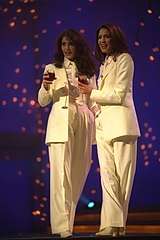 | ||
| 2019 | Tel Aviv | Expo Tel Aviv | Erez Tal, Bar Refaeli, Assi Azar and Lucy Ayoub | 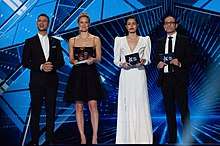 |
Awards
Marcel Bezençon Awards
| Year | Category | Song | Composer(s) lyrics (l) / Music (m) |
Performer | Final | Points | Host city | Ref. |
|---|---|---|---|---|---|---|---|---|
| 2010 | Press Award | "Milim" (מילים) | Tomer Hadadi (m) and Noam Horev (l) | Harel Skaat | 14 | 71 | ||
| Artistic Award[lower-alpha 8] | ||||||||
| Composer Award |
Related involvement
Commentators and spokespersons
Until 2018, Israel only had a television commentator once, in 1979. In most cases, they opted instead to simply broadcast the transmission without commentary and with Hebrew subtitles. Beginning in 2013 and lasting until 2017, they also aired the contest with Arabic subtitles on IBA Channel 33. 1980 was the only year that was not broadcast either on television or radio due to Yom HaZikaron; in both 1984 and 1997, which Israel also had to miss due to the holiday, the IBA aired the show on delay, and there was no radio broadcast. They also typically provided radio commentary beginning in the early '80s, unless they weren't participating that year (excepting 2000). They had no commentary of either sort until 2013, when they resumed radio broadcasting, and 2018, when they had their first television commentators since 1979. The Israeli transmission was also shown worldwide via the Israeli Network between 2003 and 2004.[7]
| Year | Television commentator | Radio commentator | Spokesperson | Ref. |
|---|---|---|---|---|
| 1972 | No commentator | Unknown | Did not participate | |
| 1973 | No radio broadcast | No spokesperson | ||
| 1974 | Yitzhak Shim'oni | |||
| 1975 | ||||
| 1976 | ||||
| 1977 | ||||
| 1978 | ||||
| 1979 | Yoram Arbel | Yitzhak Shim'oni | Dan Kaner | |
| 1980 | No broadcast | Did not participate | [1] | |
| 1981 | No commentator | Daniel Pe'er | Dan Kaner | |
| 1982 | Yitzhak Shim'oni | |||
| 1983 | ||||
| 1984 | Delayed, no commentator | No radio broadcast | Did not participate | |
| 1985 | No commentator | Daniel Pe'er | Yitzhak Shim'oni | |
| 1986 | ||||
| 1987 | Yigal Ravid | |||
| 1988 | ||||
| 1989 | ||||
| 1990 | ||||
| 1991 | ||||
| 1992 | Yitzhak Shim'oni | Daniel Pe'er | ||
| 1993 | Daniel Pe'er | Danny Rup | ||
| 1994 | No radio broadcast | Did not participate | ||
| 1995 | Danny Rup | Daniel Pe'er | ||
| 1996 | No radio broadcast | Did not participate | ||
| 1997 | Delayed, no commentator | |||
| 1998 | No commentator | Daniel Pe'er | Yigal Ravid | |
| 1999 | Yoav Ginai | |||
| 2000 | No radio broadcast | |||
| 2001 | Daniel Pe'er | |||
| 2002 | Michal Zoharetz | |||
| 2003 | ||||
| 2004 | No radio broadcast | Merav Miller | ||
| 2005 | Dana Herman | |||
| 2006 | ||||
| 2007 | Jason Danino-Holt | |||
| 2008 | Noa Barak-Weshler | |||
| 2009 | Ofer Nachshon | |||
| 2010 | ||||
| 2011 | ||||
| 2012 | ||||
| 2013 | Kobi Menora (all shows); Ofer Nachshon (semi-final 1); Amit Kotler, Yuval Caspin (semi-final two); Ron Levinthal, Kobi Oshrat, Yhaloma Bat Porat (final)[11] | |||
| 2014 | Kobi Menora, Yuval Caspin (all shows)[12] | |||
| 2015 | Kobi Menora (all shows); Yuval Caspin (semi-final 1); Tal Argaman (semi-final 2)[13] | |||
| 2016 | Kobi Menora, Or Vaxman, Nancy Brandes (semi-final 2 and final)[14][15] | |||
| 2017 | Kobi Menora, Dori Ben Ze'ev, Alon Amir (all shows)[16] | |||
| 2018 | Asaf Liberman, Shir Reuven (semi-final 1) Itai Herman, Goel Pinto (semi-final 2) Erez Tal, Idit Hershkowitz (final) | Lucy Ayoub | ||
| 2019 | Sharon Taicher, Eran Zarachowicz | Izhar Cohen | ||
| Not announced before cancellation | ||||
Controversy
Israeli singer Omar Adam refused to participate in the 2019 Eurovision due to the necessary violations of Shabbat that would occur.[21]
Gallery
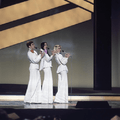 Chocolate, Menta, Mastik in The Hague (1976)
Chocolate, Menta, Mastik in The Hague (1976)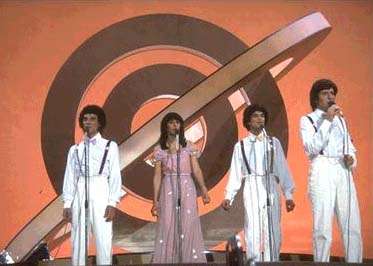 Milk and Honey, including Gali Atari, in Jerusalem (1979)
Milk and Honey, including Gali Atari, in Jerusalem (1979)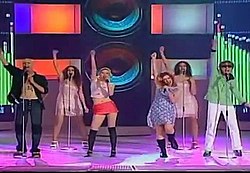
- David D'Or in Istanbul (2004)
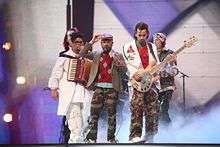
 Boaz in Belgrade (2008)
Boaz in Belgrade (2008).jpg) Harel Skaat in Oslo (2010)
Harel Skaat in Oslo (2010) Dana International in Düsseldorf (2011)
Dana International in Düsseldorf (2011).jpg) Moran Mazor in Malmö (2013)
Moran Mazor in Malmö (2013)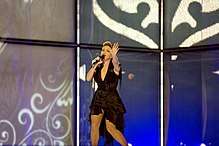 Mei Finegold in Copenhagen (2014)
Mei Finegold in Copenhagen (2014)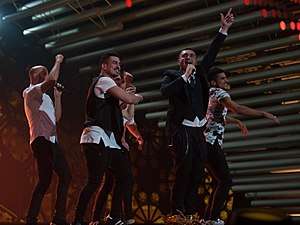 Nadav Guedj in Vienna (2015)
Nadav Guedj in Vienna (2015)


 Kobi Marimi in Tel Aviv (2019)
Kobi Marimi in Tel Aviv (2019)
Arab reaction to Israeli participation
In 1978, during the performance of the Israeli entry, the Jordanian broadcaster JRTV suspended the broadcast, and instead showed pictures of flowers. When it became apparent during the later stages of the voting sequence that Israel was going to win the contest, JRTV abruptly ended the transmission.[22] Afterwards, the Jordanian news media refused to acknowledge the fact that Israel had won, and announced that the winner was Belgium (which had actually come in second).[23] By coincidence, Israel did not broadcast the victory either, as the IBA did not buy enough broadcasting time. The victory was broadcast the next day.
At the time, Israeli Television was in its infancy and broadcasting in black & white. Many/most Israelis therefore watched international events in colour, using the signal from neighbouring Jordan. As Jordan did not broadcast the Israeli entry and the IBA did not broadcast the results part of the event, the win only became known as a result of radio broadcasts.
Because of Israel's participation in the Eurovision Song Contest, many Arab states that are eligible to participate do not do so. Tunisia, Morocco, and Lebanon are cases in point. Tunisia was about to participate in 1977, but decided not to do so in the end; Lebanon was just about to participate in 2005 when it withdrew (incurring a fine by the EBU) because Lebanese law does not allow recognition of Israel, and consequently Lebanese television would not transmit any Israeli material – which would have been a violation of the EBU's rules.[24]
See also
Notes
- Israel failed to qualify for the 1996 contest. There was an audio-only pre-qualification round for all countries (excluding hosts Norway). The official Eurovision site does not count 1996 in Israel's list of appearances.
- Spain originally gave its 12 points to Israel and 10 to Norway. After the broadcast it was announced that Spanish broadcaster wrongly tallied the votes and Germany should have got the top mark - 12 points - instead of being snubbed, as it happened. The mistake was corrected and so Germany was placed 7th over Norway. Israel and Norway both received 2 points less than originally and Croatia, Malta, Portugal, United Kingdom, Netherlands, Belgium, Estonia and Turkey all received one point less than indicated during the broadcast.
- According to the then-Eurovision rules, the top ten non-Big Four countries from the previous year along with the Big Four automatically qualified for the Grand Final without having to compete in semi-finals. For example, if Germany and France placed inside the top ten, the 11th and 12th spots were advanced to next year's Grand Final along with all countries ranked in the top ten.
- Contains several words in Hebrew.
- The host country did not have to compete in the semi-finals.
- Contains phrases in Hebrew and Arabic.
- The 2020 contest was cancelled due to
the COVID-19 pandemic. - Voted by commentators.
References
- 1980 Eurovision, eurovision.tv
- Spiteri, Steven (22 March 2020). "Eden Alena back for Eurovision 2021". Eurovisionworld.
- "Israeli grand slam in the Marcel Bezençon Awards". eurovision.tv. 31 May 2010. Retrieved 8 December 2019.
- "OGAE POLL 2018 – FINAL Results". OGAE. Retrieved 8 December 2019.
- › misc https://www.haaretz.co.il › misc Check
|url=value (help). Missing or empty|title=(help) - https://www.makorrishon.co.il/nrg/online/5/ART/935/702.html. Missing or empty
|title=(help) - "EBU.CH :: 2004_05_11_ESC". EBU. Archived from the original on 8 April 2005. Retrieved 23 June 2020.
- Barak, Itamar (10 May 2005). "Dana Herman to give Israeli televote". ESCToday. Retrieved 22 February 2020.
- Barak, Itamar (19 April 2007). "Former MTV Europe VJ to present Israel's votes". ESCToday. Retrieved 22 February 2020.
- Granger, Anthony (31 March 2018). "Israel: Lucy Ayoub Announced as Eurovision 2018 Spokesperson". Eurovoix. Retrieved 22 February 2020.
- "88FMאירווזיון 2013 ב" [88FM in Eurovision 2013]. Israel Broadcasting Authority (in Hebrew). 11 May 2013. Archived from the original on 13 December 2013. Retrieved 13 May 2013.
- המופע של פרנק נֵף לקראת אירוויזיון 2014 [The performance of the Frank Neff preparation for Eurovision 2014]. Israel Broadcasting Authority (in Hebrew). 17 April 2014. Archived from the original on 24 April 2014. Retrieved 24 April 2014.
- אירוויזיון 2015 מוינה בערוץ הראשון [Eurovision 2015 is classified into the first channel]. Israel Broadcasting Authority (in Hebrew). 12 May 2015. Archived from the original on 24 September 2015. Retrieved 12 May 2015.
- נבחרו חברי צוות השיפוט הישראלי לאירוויזיון. iba.org.il (in Hebrew). Israel Broadcasting Authority. 3 May 2016. Retrieved 5 May 2016.
- "בהצלחה ל-Hovi Star הערב ב-Eurovision Song... - 88 FM - הדף הרשמי". facebook.com (in Hebrew). Kol Yisrael. 12 May 2016. Retrieved 12 May 2016.
- Laufer, Gil (10 May 2017). "Israel national broadcaster IBA is officially shut down". esctoday.com. ESCToday. Retrieved 10 May 2017.
- Granger, Anthony (15 April 2019). "Israel: Izhar Cohen Revealed as Spokesperson". Eurovoix. Retrieved 22 February 2020.
- "נחשפו פרשני האירוויזיון של 'כאן'". kipa.co.il (in Hebrew). 22 January 2020.
- "Omer Adam: I won't violate Shabbat to appear at Eurovision". Jerusalem Post. 10 January 2019.
- O'Connor, John Kennedy (2005). The Eurovision Song Contest 50 Years The Official History. London: Carlton Books Limited. ISBN 1-84442-586-X.
- "Eurovision Song Contest 1978". esctoday.com. 2005. Retrieved 8 May 2007.
- "Lebanon withdraws from Eurovision". BBC News. 18 March 2005. Retrieved 15 July 2006.